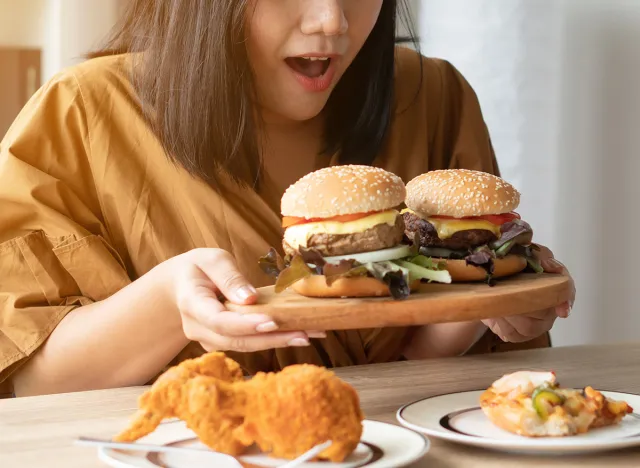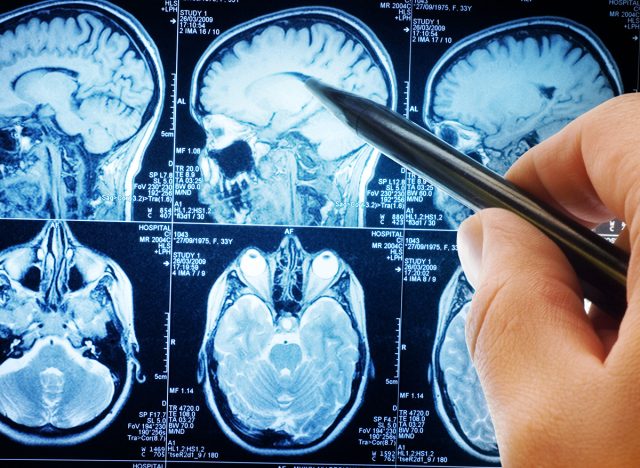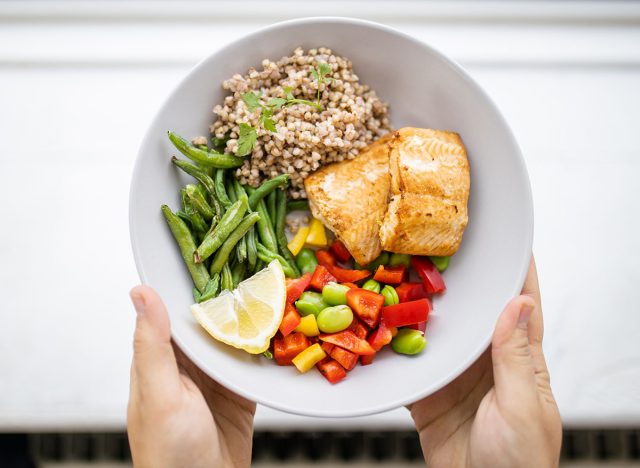8 Tricks to Stop Overeating for Good That Therapists Swear By

Have you ever found yourself struggling with overeating despite your best efforts to control it? You're not alone. Sarah Dosanjh, a qualified psychotherapist specializing in binge eating recovery, offers unique insights into this common challenge. With over 2 million views on YouTube and as the author of "I Can't Stop Eating," Sarah brings a wealth of experience to the table. Her approach goes beyond traditional advice, focusing on the psychological aspects of overeating. Let's dive into Sarah's specific, actionable strategies that can help you regain control over your eating habits.
Understanding Overeating
According to the Cleveland Clinic, overeating is consuming food past the point of fullness, often when you're not even hungry. Erma Levy, a research dietitian at MD Anderson, explains, "It takes about 20 minutes for your brain to send a signal to the stomach to let you know that you're full. Overeating occurs when you continue to eat beyond this point of fullness."
The Physical Effects of Overeating

Overeating can lead to discomfort, feeling tired, sluggish, or even drowsy as your expanded stomach pushes against other organs. Levy notes, "To break down food, the stomach produces hydrochloric acid. If you overeat, this acid may back up into the esophagus, resulting in heartburn."
RELATED: I Lost 42 Pounds with These 6 High-Protein Meals
Calm Your Lower Brain

In her post, Sarah underlines the importance of calming our lower brain, where emotions and primal drives reside. She explains, "Our lower brain is where we have our emotions. We have our primal drives, including our appetite, and in our higher brain, we have our executive functioning and decision-making."
The Two-Step Approach to Brain Calming

To calm the lower brain, Sarah recommends two key steps:
- Eat enough: "If you are trying to restrict, you will continue to trigger off desires to overeat. That's what's supposed to happen," Sarah warns.
- Process your emotions: Sarah introduces a simple yet effective technique for emotional processing, the "butterfly hug."
The Butterfly Hug Technique

Sarah describes the butterfly hug as follows: "Hook your thumbs together like this, so it looks like, yep, a butterfly. You place it on your chest, and you just start to tap. It's as simple as that, and this is bilaterally stimulating my brain. My brain's going left, right, left-right, and what's happening is there's two parts of the brain that can communicate with each other."
Shift Your Scarcity Mindset

Sarah addresses the psychology of scarcity, which can drive overeating even when we're eating enough. She proposes a shift in decision-making:
"Usually, when you are trying to decide whether to eat something or not, you're treating it as a yes or no decision. So yes, I can have it, or no, I can't. Some brains get very threatened by the no, I can't have. It makes you want it even more, right?" Sarah explains.
RELATED: I'm a Petite Nutritionist and These 6 Signs Show You're Actually Losing Weight
The "Now or Not Now" Approach
Instead of yes or no, Sarah suggests, "This is not a yes or no decision. This is a now or not now decision. It's like our brains need constant reminding that the food is available. It is going to be allowed later as well."
Disrupt Habitual Patterns

To break the cycle of overeating, Sarah suggests disrupting habitual patterns. She notes, "If you've ever had that, you haven't overeaten yet, but you have that feeling of inevitability that it's coming, and you feel powerless before it's even happened, you feel powerless to stop yourself. This is what's happening in the brain. You're stuck on this track, and it's like you can't get off it."
The Power of Questioning

Her solution? Ask a simple question: "What happens if I don't eat this food right now?" She explains, "When you ask the question, you're just asking it to imagine. It needs to have an image or a picture of an idea of what that would look like and feel like not to have the food right now."
Embrace Reverse Psychology

Sarah introduces the concept of reverse psychology in managing overeating. She suggests two approaches: the first is to plan to eat more: "If you're anything like me, when I was trying to get a handle on my eating, I was always planning to eat less, and so then I always ended up eating more. When that switched, and I actually started planning to eat more, I noticed the paradox was that I ate less," Sarah shares.
Shift Focus Away from Food

Sarah's second approach is to shift focus away from food: "If you are someone for whom your recovery from your eating issues has become your whole world, it is your purpose in life to fix yourself with this food thing. What would it be like to just go? Maybe I give myself a few weeks where I don't think about this? Well, I go and live my life. I focus on all the things I imagine I would be focusing on once I have fixed my problem," Sarah proposes.
RELATED: Here Is How Much Weight You Can Really Lose on Ozempic, According to a Doctor
The Importance of Balance
Sarah concludes by emphasizing the importance of finding a middle ground: "My frustration out there is so many of the people who are trying to help people with this problem of overeating, they're either looking at it from a, oh, how do you say yes to food more often? Those are the people in the anti-diet world. Like say yes, say yes, say yes, and then you've got people over here on the other side going, this is how you say no to food. This is how you say, no, no, no. And I'm trying to find this middle ground where it's like we need to learn how to say yes and no and to practice doing both of those in an emotionally, psychologically, and physically healthy way."
The Role of Stress in Overeating

Stress is a significant factor in overeating. As Levy explains, "Increased cortisol is a fight-or-flight response that tells you it's time to find food." This increase in cortisol levels can make you crave high-sugar, fat, or salty foods.
Practical Strategies to Prevent Overeating

To prevent overeating, Levy suggests, "Fill your plate with vegetables, which contain more fiber and will slow down your eating." The Cleveland Clinic recommends practicing good self-care: regular exercise, sufficient sleep, and managing stress. Eating slowly and mindfully can help you recognize when you're full.
Long-Term Health Risks

When you eat more calories than you burn, your body stores the excess as fat, potentially leading to overweight or obesity. This increases your risk for cancer and chronic health problems. Frequent overeating can slow down digestion, causing food to stay in your stomach longer and turn into fat. It can also disrupt your sleep cycles, making it hard to sleep through the night.
RELATED: 10 Weight Loss Mistakes You Need to Stop Making
8 Expert-Backed Strategies to Conquer Overeating

By implementing these specific strategies and understanding the science behind overeating, you can start to address both the psychological and physical aspects of overeating and work towards a healthier relationship with food.
- Eating enough to avoid triggering overeating desires,
- Processing emotions using the "butterfly hug" technique,
- Shifting from a scarcity mindset to a "now or not now" approach,
- Disrupting habitual patterns by questioning the consequences of not eating,
- Employing reverse psychology by planning to eat more,
- Shifting focus away from food to other life aspects,
- Filling your plate with vegetables to slow down eating,
- Practicing mindful, slow eating.
And if you enjoyed this article, take advantage of these 15 Quick Ways to Lose Body Fat Percentage in a Week.




